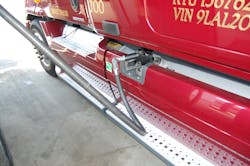Both diesel and gasoline prices continued to climb this week in the U.S., according to data tracked by the Energy Information Administration (EIA), with the agency pointing to “season trends” as the reason for the upward trend for gasoline prices.
Average U.S. retail pump prices for diesel ticked up 4/10ths of a penny this week to $3.975 per gallon, EIA reported, which is 12.4 cents per gallon higher compared to the same week in 2013.
Diesel prices registered a decline along the East Coast but not only were those declines small, the East Coast regions remained home to some of the most expensive diesel in the country.
EIA noted that prices for diesel declined in New England by 4/10ths of a penny to $4.208 per gallon, by 6/10ths of a penny to $4.185 in the Central Atlantic area; by 4/10ths of a penny to $3.949 in the Lower Atlantic region; and dropped 5/10ths of a penny to $4.065 for the East Coast as a whole.
The West Coast and California witnessed the biggest one-week jump in diesel prices, climbing 2.5 cents to $4.055 per gallon and 3.8 cents to $4.140 per gallon, respectively, according to EIA’s numbers. However, the agency pointed out that with California removed from the mix diesel prices on the West Coast only increased 9/10ths of a penny to $3.954 per gallon.
Average U.S. retail pump prices for gasoline increased 3 cents to $3.713 per gallon this week, which is 19.3 cents per gallon higher compared to the same week in 2013, EIA said.
Gasoline prices increased in all regions of the country except for the Gulf Coast, where they remained flat at $3.491 per gallon.
The biggest one-week jumps in gasoline prices occurred in New England (7 cents to $3.755) and the Central Atlantic region (7.4 cents to $3.748), while gasoline exceed the $4 per gallon mark on the West Coast by rising 4.6 cents this week to hit $4.073. However, EIA noted that with California’s pricing removed from the mix, the West Coast recorded a 4.2 cent increase to $3.761 per gallon.
The agency is attributing the recent rise in gasoline prices to an increase in “crack spreads” – the difference between the price of wholesale gasoline and the price of crude oil – attributable to typical seasonal factors such as refinery maintenance and higher travel-related demand as the driving season begins.
EIA also noted that the average “crack spread” during the first four months of 2014 has been close to the five-year average, yet this year’s seasonal increase has been modestly steeper than normal, which partially stems from lower-than-normal crack spreads in January and February – likely related to reduced levels of driving due to the severe winter weather in many parts of the country.
About the Author
Sean Kilcarr
Editor in Chief
Sean Kilcarr is a former longtime FleetOwner senior editor who wrote for the publication from 2000 to 2018. He served as editor-in-chief from 2017 to 2018.
